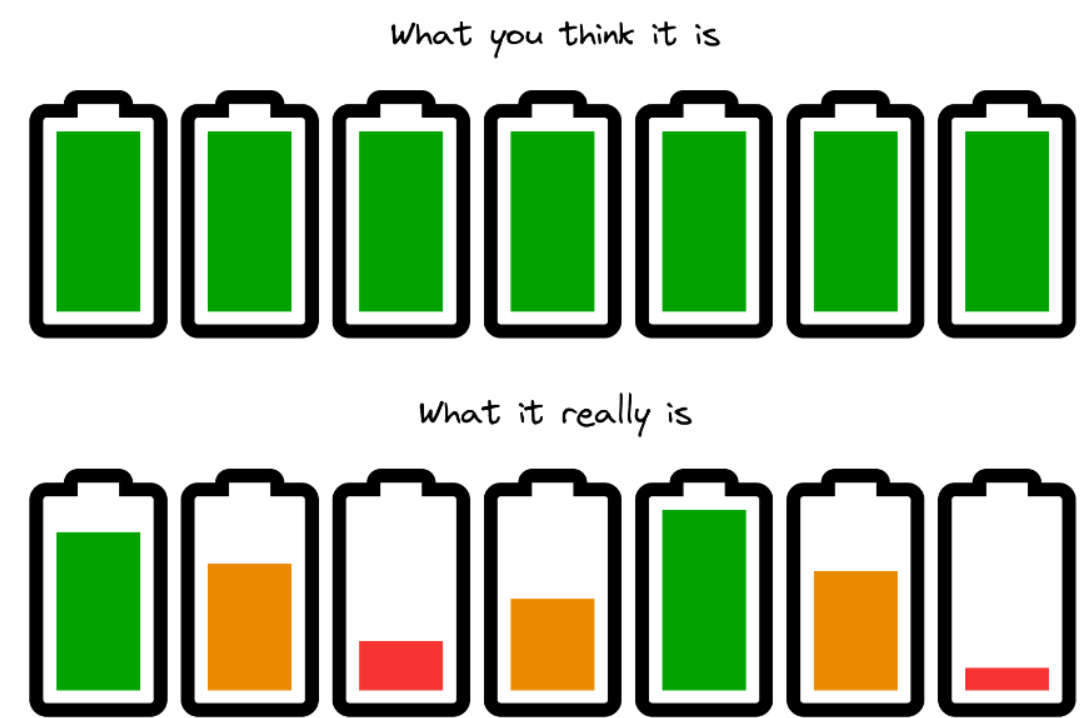You've probably heard countless times that consistency is key in learning any foreign language. The question is: what is consistency?

Ii like this illustration BUT I would argue that on some days the batteries should be completely 'empty'.
Is this what you thought consistency was?
Learning little and often is the best way to help form a habit and stick to a routine. On average it takes around two months before a new behaviour becomes automatic. But it can vary widely depending on the person and their circumstances.
The important thing is that:
1. You don't need to give your 100% every time. It's simply not realistic or even possible. By thinking that it is possible, you're setting yourself up for failure. So instead, why not start focussing on giving your best? Depending on the day, the circumstances, how you're feeling etc., this 'best' will be different on different days. And that is OK!
2. Work on improving your English in small chunks, daily if you can (or even every 2-3 days). By doing this you focus not on the end goal but on making progress, even if it's just a little progress. A few months ago I worked with a fantastic private English student (Kate from Ukraine) who was preparing for her IELTS exam and due to her work commitments she could spend around 2-2.5 hours on IELTS prepping on Wednesdays, Fridays and Sundays (in addition to having one-to-one lessons with me twice a week). Despite this limited time, she stayed committed and absolutely smashed her IELTS, getting band 7.5 overall!
The important thing is that:
1. You don't need to give your 100% every time. It's simply not realistic or even possible. By thinking that it is possible, you're setting yourself up for failure. So instead, why not start focussing on giving your best? Depending on the day, the circumstances, how you're feeling etc., this 'best' will be different on different days. And that is OK!
2. Work on improving your English in small chunks, daily if you can (or even every 2-3 days). By doing this you focus not on the end goal but on making progress, even if it's just a little progress. A few months ago I worked with a fantastic private English student (Kate from Ukraine) who was preparing for her IELTS exam and due to her work commitments she could spend around 2-2.5 hours on IELTS prepping on Wednesdays, Fridays and Sundays (in addition to having one-to-one lessons with me twice a week). Despite this limited time, she stayed committed and absolutely smashed her IELTS, getting band 7.5 overall!
Progress is progress. And progress doesn't make perfect. It makes BETTER.
Some say that to have consistency you need to make sure there are no gaps. Like I said earlier, I disagree. In language learning, preparing for IELTS or any other English exam, you will at times hit the wall, your brain will be fuming, and you might even feel discouraged and super demotivated. Has this ever happened to you? It has to me! So my tip number 3 is to:
3. Take a short break when you hit the wall, give your brain time to rest and recharge, and you'll see, you'll come back stronger, more focussed and more fresh!
3. Take a short break when you hit the wall, give your brain time to rest and recharge, and you'll see, you'll come back stronger, more focussed and more fresh!
The last super important thing to remember is:
4. Staying accountable - make sure there is someone (apart from you) to give you reasons to continue studying, someone that will check in with you every few days to see how you're doing, someone that will help you stay in track, someone whom you'll not want to disappoint! For those who join my IELTS Accelerator program, I am not just their teacher, but most importantly, I'm their accountability partner.
How consistent are you with improving your English? If you're preparing for the IELTS exam, how consistent is your prep? Let me know!
That's it from me! As always, thanks for reading :)
Cheerio!
Paulina x


